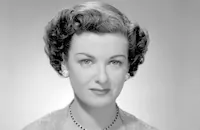Week Ends Only
Cast & Crew
Alan Crosland
Joan Bennett
Ben Lyon
John Halliday
Halliwell Hobbes
Walter Byron
Film Details
Technical Specs

Synopsis
After her wealthy father goes broke and dies following the stock market crash, former debutante Venetia Carr cannot find a job. Her friend and former butler, Martin, who did not have his money in stocks, then hires her as a hostess at his speakeasy, the most exclusive in New York. When Arthur Ladden, a rich older patron, invites Venetia to his chateau in the mountains for his weekend houseparty, she accepts under her terms: that she is obliged only to act as a hostess. As she returns in the morning to her modest room, she spies a neighbor stealing a bottle of milk outside her door. The man, Jack Williams, a struggling artist, appeals to Venetia's sense of humor, and she invites him to breakfast. Although Venetia evades Ladden's attempted intimacies at the chateau, he hires her for the rest of the summer weekends. With her newly earned money, Venetia decides to buy secretly some of Jack's artwork, and she sends Martin to purchase a picture for $150. Happy that he now does not have to look for work, Jack begins a portrait of Venetia to enter in a competition from which he could win a trip to Europe to study and $2,000. During their sessions together, Jack and Venetia fall in love. After Jack runs out of money again, Martin sends his bartender and later his washroom attendant to purchase drawings. When Ladden sees Jack's work hanging in Martin's office and learns that Venetia has been helping the artist, he suspects a rival and arranges for Jack to come to his chateau on a Sunday, ostensibly to paint murals for his aquarium. When Jack arrives, he sees Venetia with Ladden and hears a drunk call her Ladden's mistress. Believing the drunk, Jack leaves and changes the portrait so that Venetia appears half-naked with a devil over her shoulder offering her jewelry. When he tells her he will enter the new picture in the competition, Venetia says she never wants to see him again. Jack wins the competition and plans to sail for Europe, while Venetia accepts Ladden's offer to accompany him to Europe. On the evening they are to leave, Jack goes to Martin's club, where he recognizes the washroom attendant, bartender and then Martin himself as the men who bought his work. When Martin tells Jack that Venetia put up the money to buy his work and that she is only going with Ladden to forget him, Martin rushes to the boat, where he embraces Venetia. Seeing this, Ladden, graciously leaves them alone.

Director

Alan Crosland
Cast

Joan Bennett
Ben Lyon

John Halliday

Halliwell Hobbes
Walter Byron

Henry Armetta

John Arledge
John Elliott

Berton Churchill
Crew
Jack Boland
Henry Clive
Edward Collins
William Conselman
Frank Dolan
Eugene Grossman
James F. Hanley
George Lipschultz
Joe List
Louis Loeffler
Earl Luick
Doris Malloy
Hal Mohr
William Skall
Robert Surtees
Gordon Wiles

Film Details
Technical Specs

Quotes
Trivia
Notes
Warner Fabian's novel was originally published serially in Illustrated Love Magazine, November 1931-April 1932. According to information in the Twentieth Century-Fox Records of the Legal Department at the UCLA Theater Arts Library, because the Hays Office objected to the use of the title of the novel in the advertising and credits of the film, the author consented that the credit would read, "From the novel by Warner Fabian." According to the MPAA/PCA files at the AMPAS Library, Darryl Zanuck, chief executive in charge of production at Warner Bros. and First National, was upset because of the similarity between the title of this film and that of First National's Week-End Marriage. Motion Picture Herald credits Alan Dinehart as playing a "broker" in this film, and his name appears in an early advertising billing sheet in the legal records, but he was not in the final film. According to the legal records, artist Henry Clive, who served as technical advisor, completed four portraits of Joan Bennett for use in the film. In the opening sequence, before the stock market crash, two animated stick figures dance on a ticker tape machine and up the emerging tape; after the crash, figures in dark top hats walk dejectedly down the tape and pull the machine crashing to the floor. According to correspondence in the MPAA/PCA files, Twentieth Century-Fox applied for certification for this film for reissue in October 1935. Joseph Breen of the Hays Office responded that because the film contained "considerable suggestiveness of loose living" and that "the entire theme of the play is not good," the company should withdraw their application.












